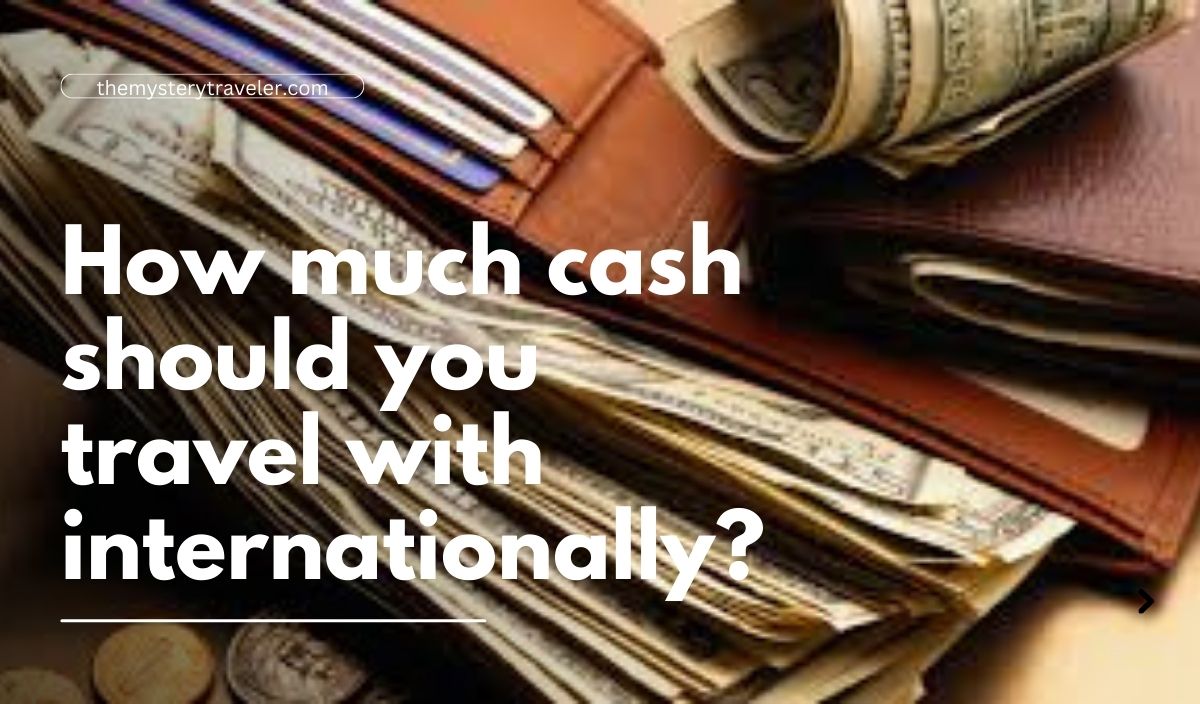When embarking on an international trip, one important question arises: How much cash should you carry? Understanding the ideal amount of money to travel with is crucial for a smooth financial experience abroad.
In this comprehensive guide, we will explore various factors to consider when determining your cash needs while traveling internationally.
From budgeting and currency exchange rates to safety considerations and alternative payment methods, we’ve got you covered.
Understanding Your Travel Needs
Before determining the amount of cash to carry, it’s essential to assess your personal spending habits, trip duration, and planned activities.
Take into account whether you prefer using cash for most transactions or rely more on electronic payment methods.
Additionally, research the availability and acceptance of electronic payments in your destination to make an informed decision.
Researching Local Currency and Exchange Rates
To effectively manage your cash while traveling internationally, familiarize yourself with the local currency and its value compared to your home currency.
Stay updated on exchange rates and fees to choose the most favorable options for currency exchange. Online currency converters and financial tools can help you accurately calculate the value of your money in the local currency.
Budgeting and Cost Estimation
Creating a realistic budget is essential for determining how much cash to carry. Consider the average daily expenses for accommodation, food, transportation, and activities at your destination.
It’s also important to account for additional costs such as tips, souvenirs, and emergencies. Remember to allow flexibility in your budget for unforeseen expenses or fluctuations in exchange rates.
Safety and Security Considerations
While carrying cash is convenient, it’s important to prioritize safety and security. Research the safety conditions of your destination and common scams to minimize risks.
Explore alternative payment methods, such as prepaid travel cards or mobile payment apps, that offer convenience while reducing the need for carrying excessive cash.
Strike a balance between accessibility and security based on your destination’s safety profile.
Banking and Money Management
Before your trip, contact your bank to understand their policies on international transactions and any associated fees.
Notify your bank of your travel plans to avoid any potential card restrictions. Research the availability of ATMs and withdrawal limits at your destination to ensure you have access to cash when needed. Consider carrying a mix of cash, credit cards, and digital wallets for added flexibility.
Splitting Funds and Storing Cash
To mitigate the risk of loss or theft, it’s advisable to split your funds across multiple sources. Carry a portion of cash in a secure location, such as a money belt or hotel safe, while using other payment methods for day-to-day transactions.
Have a backup plan in case of emergencies, such as carrying emergency funds or traveler’s checks that can be easily replaced.
Adjusting Your Cash Strategy Throughout the Trip
As you travel, monitor your spending and adjust your cash usage accordingly. Evaluate the accessibility of ATMs and currency exchange facilities in different locations.
Be mindful of currency conversion fees and exchange rates when making transactions. Stay updated on financial news and changes in exchange rates to make informed decisions throughout your journey.
Should you bring cash when traveling internationally?
When traveling internationally, it is advisable to bring a combination of cash and alternative payment methods.
Carrying cash provides convenience for small transactions, local markets, and establishments that may not accept electronic payments. Additionally, having cash on hand can be useful during emergencies or in areas with limited access to ATMs.
However, it’s essential to exercise caution and not carry excessive amounts of cash to minimize the risk of loss or theft.
What is the maximum amount of cash allowed to travel?
There is no universal maximum amount of cash allowed to travel as regulations vary by country. However, most countries have regulations in place to prevent money laundering and illegal activities.
It is crucial to research the specific regulations of both your departure and destination countries regarding the maximum amount of cash you can carry legally.
Failure to comply with these regulations can result in the seizure of funds or other legal consequences.
Can I fly with 20k cash?
Flying with a large sum of cash, such as $20,000, is possible but may raise suspicions and trigger additional scrutiny from authorities.
Some countries have specific requirements for declaring amounts over a certain threshold when entering or exiting.
It is crucial to research the regulations of both your departure and destination countries regarding the declaration of large amounts of cash.
Failing to declare the cash when required can lead to legal complications and potential seizure of funds.
What happens when you declare over $10,000?
When traveling internationally, if you are carrying cash or other monetary instruments totaling $10,000 or more, it is typically required to declare it to customs authorities.
Failure to declare amounts over this threshold can result in penalties, including fines, seizure of funds, and potential legal consequences.
Declaring the amount ensures compliance with anti-money laundering regulations and facilitates a transparent process.
It is important to be aware of the specific declaration requirements of both your departure and destination countries to avoid any complications.
Read: Exploring Big Sur Fog – A Captivating Photo Journey
Read: Auckland Layover Made Easy: Insider Tips for a Visit
Read: Casa Dorada Timeshare Presentation: Luxury in Los Cabos, Mexico
Read: Yosemite to Grand Canyon Road Trip: Exploring Nature’s Beauty
Conclusion
Determining how much cash to carry when traveling internationally requires careful consideration of various factors, including your personal preferences, destination, budget, and safety concerns.
By planning ahead, researching exchange rates, and exploring alternative payment methods, you can ensure a smooth and secure financial experience abroad.
Find the right balance between convenience, security, and budgeting needs to make the most of your international travel adventures.
